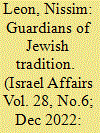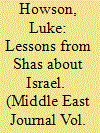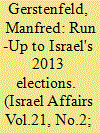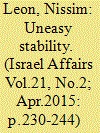| Srl | Item |
| 1 |
ID:
122069


|
|
|
|
|
| Publication |
2013.
|
| Summary/Abstract |
Maayan Hahinuch Hatorani is a Haredi (ultra-Orthodox) educational network for elementary aged children in Israel, founded by Shas, a Sephardi ultra-Orthodox political party. The network's beginnings were in the second half of the 1980s, during the Shas' first Knesset term. It then consisted of around 30 small Talmudei Torah (Haredi elementary schools for boys), set up independently by Sephardi Haredi educational activists. This article describes their motives and activities in establishing schools for the Mizrahi community and explains the decisive contribution of two additional factors to the establishment of Maayan Hahinuch Hatorani: the senior Sephardi rabbis who awarded religious legitimacy, and the Shas Movement which provided political and financial support.
|
|
|
|
|
|
|
|
|
|
|
|
|
|
|
|
| 2 |
ID:
187562


|
|
|
|
|
| Summary/Abstract |
The big drama of Israel’s four closely spaced national elections in 2019–21 was accompanied by another, smaller, drama: the country’s plunge into political chaos gave the Shas party an opportunity for electoral, organisational, and political revitalisation. The four election campaigns transformed Shas from a Mizrahi-Haredi party in decline, barely able to pass the minimum vote threshold, into a stable party practicing a tightly focused politics – living proof that Haredi politicians were again occupying positions of power and influence. Not only did Shas do outstanding organisational and political work; it also demonstrated an impressive ability to align with the Israeli right’s core national-political agenda: the connection between security and tradition. The language of the Shas message evolved from one election campaign to another: what started as a Haredi (ultra-Orthodox) discourse of cultural partnership with a religious-lite or masorti (traditionalist) public turned into a Zionist discourse of national partnership with a ‘right-lite’ voting public (Likud).
|
|
|
|
|
|
|
|
|
|
|
|
|
|
|
|
| 3 |
ID:
140301


|
|
|
|
|
| Summary/Abstract |
This article focuses on the Israeli ethno-religious party Shas and its role in the Israeli social and political structure. It is argued that while Shas functions successfully in Israel’s Western-style political system, it does so as a more typical “Middle Eastern” party. Thus understanding the context within which Shas operates and its relation to political and societal divisions offers an insight into Israeli society and its political system.
|
|
|
|
|
|
|
|
|
|
|
|
|
|
|
|
| 4 |
ID:
137544


|
|
|
|
|
| Summary/Abstract |
On 15 October 2012, the 18th Knesset – which had been elected in February 2009 – voted unanimously to dissolve. The date for the elections for the 19th Knesset was then set for 22 January 2013. This article follows the events leading to the election day. It shows that there were four distinct phases during that period. It describes the internal organization and primary elections in Israel's major parties, Likud and Avoda; the debate about the formation of political alliances which led to the joint list of Likud–Israel Beiteinu; the stabilization of the political blocs; and the emergence of new political forces (such as Yesh Atid). The article also discusses the impact of major events, such as the military operation Pillar of Defence, on the elections and the electoral campaign. The article discusses the parties’ campaigns and the proliferation of opinion polls. It also shows that much of the campaigning of the parties was directed against other parties of the same bloc, be it the centre-right or the centre-left.
|
|
|
|
|
|
|
|
|
|
|
|
|
|
|
|
| 5 |
ID:
093900


|
|
|
|
|
| Publication |
2010.
|
| Summary/Abstract |
This study examines the respective performances of the various religious parties in the 2009 election. It concludes that while the ultra-Orthodox (Haredi) parties broadly maintained their electoral strength, the national religious parties were rocked by debilitating conflicts, ideological splits and intra-institutional fractures which resulted in a substantial decrease in their Knesset representation.
|
|
|
|
|
|
|
|
|
|
|
|
|
|
|
|
| 6 |
ID:
137547


|
|
|
|
|
| Summary/Abstract |
This article examines the emergency election campaign launched by the Haredi parties in anticipation of the 2013 general elections in Israel, in order to attract the votes of those generally perceived as their automatic supporters – the Haredim. The 2013 campaign was a struggle for the ‘converted’ – the Haredi vote – amongst UTJ and Shas supporters alike. The battle was fought openly and assertively. The intensive efforts ultimately achieved what may be described as an uneasy electoral stability. The reasons for this situation, and how the Haredi parties addressed it, is the subject of this article.
|
|
|
|
|
|
|
|
|
|
|
|
|
|
|
|